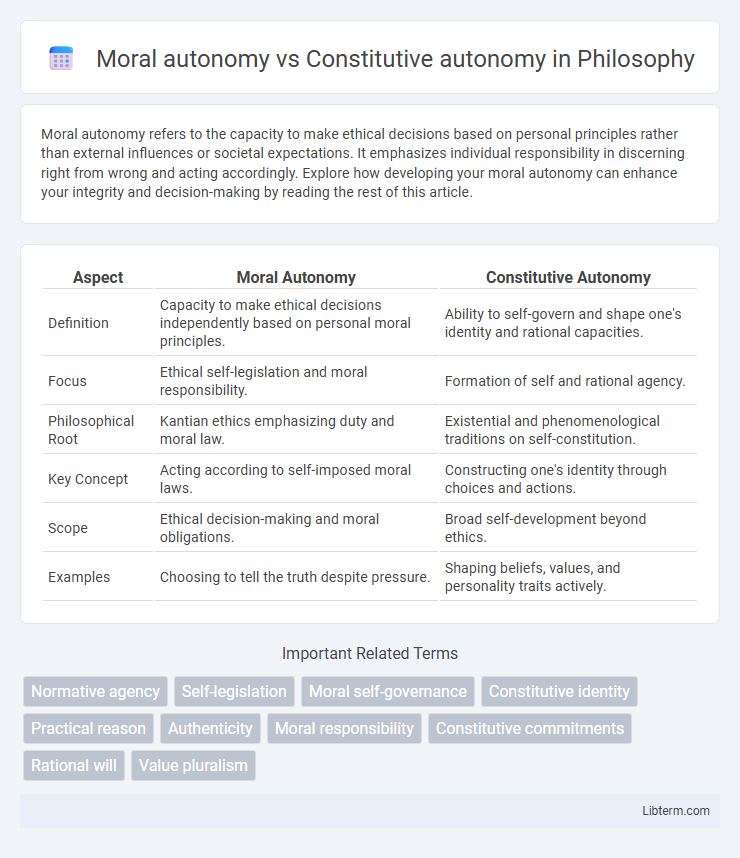Moral autonomy refers to the capacity to make ethical decisions based on personal principles rather than external influences or societal expectations. It emphasizes individual responsibility in discerning right from wrong and acting accordingly. Explore how developing your moral autonomy can enhance your integrity and decision-making by reading the rest of this article.
Table of Comparison
| Aspect | Moral Autonomy | Constitutive Autonomy |
|---|---|---|
| Definition | Capacity to make ethical decisions independently based on personal moral principles. | Ability to self-govern and shape one's identity and rational capacities. |
| Focus | Ethical self-legislation and moral responsibility. | Formation of self and rational agency. |
| Philosophical Root | Kantian ethics emphasizing duty and moral law. | Existential and phenomenological traditions on self-constitution. |
| Key Concept | Acting according to self-imposed moral laws. | Constructing one's identity through choices and actions. |
| Scope | Ethical decision-making and moral obligations. | Broad self-development beyond ethics. |
| Examples | Choosing to tell the truth despite pressure. | Shaping beliefs, values, and personality traits actively. |
Defining Moral Autonomy
Moral autonomy refers to an individual's capacity to make ethical decisions guided by internal principles rather than external pressures or societal norms. It emphasizes self-governance in moral reasoning, where personal values and rational reflection determine right and wrong. This contrasts with constitutive autonomy, which centers on the inherent structures shaping an individual's identity and actions within a social context.
Understanding Constitutive Autonomy
Constitutive autonomy refers to the capacity of an individual or system to self-create and maintain its defining structures and identities independent of external control, emphasizing internal self-determination rather than moral choice. It contrasts with moral autonomy, which centers on the ability to make ethical decisions based on principles and values. Understanding constitutive autonomy involves recognizing how agents sustain their existence and functions through inherent organizational norms, shaping behavior beyond mere moral reasoning.
Historical Perspectives on Autonomy
Historical perspectives on autonomy reveal that moral autonomy, rooted in Immanuel Kant's philosophy, emphasizes individual self-governance based on rationality and moral law. Constitutive autonomy, influenced by contemporary social contract theories, focuses on the formation of autonomous identity through social and institutional contexts. Debates from the Enlightenment to modern political theory highlight the tension between personal moral agency and the institutional frameworks that shape autonomy.
Key Philosophers on Moral and Constitutive Autonomy
Immanuel Kant is a central figure in moral autonomy, emphasizing the individual's capacity to legislate moral law through reason, which defines moral responsibility and freedom. On the other hand, constitutive autonomy, explored by philosophers like John Searle and Charles Taylor, focuses on the social and collective dimensions of autonomy that constitute personal identity and agency within cultural and institutional frameworks. Kant's moral autonomy highlights rational self-governance, while constitutive autonomy underscores the role of social practices in shaping autonomous individuals.
Core Differences Between Moral and Constitutive Autonomy
Moral autonomy centers on the individual's capacity to make ethical decisions based on internal principles, emphasizing freedom from external moral authority. Constitutive autonomy involves the self-governing processes that define one's identity and agency, highlighting the role of social and structural frameworks in shaping autonomy. The core difference lies in moral autonomy prioritizing ethical self-legislation, whereas constitutive autonomy focuses on the foundational conditions and capacities that enable self-governance.
Interplay Between Moral Values and Self-Identity
Moral autonomy represents the capacity to govern one's actions based on internalized ethical principles, while constitutive autonomy relates to the formation of self-identity through lived experiences and social contexts. The interplay between moral values and self-identity shapes individuals' decision-making processes, influencing how personal beliefs integrate with societal norms. Understanding this dynamic highlights the intricate relationship between ethical agency and the continuous construction of personal identity.
Autonomy in Ethical Decision-Making
Moral autonomy in ethical decision-making emphasizes individuals' capacity to make moral judgments based on personal principles without external influence, highlighting self-governance in ethical reflection. Constitutive autonomy, by contrast, refers to the structural conditions and social contexts that shape and enable these ethical decisions, acknowledging the role of institutional, cultural, and relational factors. Understanding the dynamic between moral and constitutive autonomy enhances the analysis of how ethical agency operates within both personal integrity and societal frameworks.
Social and Cultural Influences on Autonomy
Moral autonomy refers to the capacity to make ethical decisions based on internal principles, while constitutive autonomy involves the formation of one's identity and values through social and cultural contexts. Social influences such as family, education, and community norms shape constitutive autonomy by providing the frameworks within which individuals develop their moral reasoning. Cultural factors, including traditions and collective narratives, deeply impact the extent to which autonomy is expressed and understood, highlighting the dynamic interaction between individual freedom and social embeddedness.
Implications for Personal Responsibility
Moral autonomy emphasizes an individual's capacity to make ethical decisions based on personal principles, directly linking to personal responsibility by holding individuals accountable for their moral choices. Constitutive autonomy relates to the formation of one's identity and values through social and relational contexts, suggesting that personal responsibility also arises from the roles and norms internalized within those frameworks. Understanding the distinction clarifies how responsibility is attributed either to independent moral reasoning or to socially constructed obligations that shape behavior.
Contemporary Debates on Autonomy in Philosophy
Moral autonomy emphasizes an individual's capacity for self-governance through ethical reasoning, asserting the importance of personal moral deliberation in decision-making. Constitutive autonomy centers on the idea that autonomy is shaped by social and institutional frameworks that constitute the self, highlighting the relational and contextual dimensions of autonomy. Contemporary debates in philosophy analyze tensions between these views, exploring how autonomy balances individual freedom with the influence of social structures and cultural norms.
Moral autonomy Infographic

 libterm.com
libterm.com